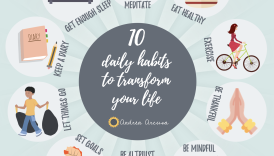Discover the Connection Between Healthy Living and Long-Term Relief

Importance of Healthy Living
Healthy living is more than just a trend; it’s a way of life that can drastically improve the quality of one’s existence. Embracing healthy habits—such as nutritious eating, regular exercise, and sufficient sleep—can lead to increased energy levels and an enhanced mood. For instance, one might find that after switching to a balanced diet, simple tasks like playing with children or climbing stairs become much more enjoyable and less strenuous.
- Discover the Connection Between Healthy Living and Long-Term Relief
- Importance of Healthy Living
- Impact on Long-Term Relief
- Healthy Eating Habits
- Nutrient-Rich Diet
- Role of Hydration
- Regular Physical Activity
- Types of Exercise
- Benefits for Long-Term Relief
- Quality Sleep
- Sleep Hygiene Practices
- Effects on Overall Health
- Stress Management Techniques
- Mindfulness and Meditation
- Importance of Relaxation
- Social Support and Connection
- Impact on Mental Health
- Building a Support Network
- Prevention Strategies
- Importance of Prevention
- Incorporating Healthy Choices
- Holistic Approach to Well-Being
- Mind-Body Connection
- Integrative Health Practices
- Benefits of Healthy Living:
- Increases lifespan
- Boosts mental health
- Improves physical health
- Enhances emotional resilience
Impact on Long-Term Relief
Engaging in healthy living practices can significantly contribute to long-term relief from various health conditions. People who prioritize a healthy lifestyle often experience reduced stress levels and lower susceptibility to chronic diseases. For example, regular physical activity can alleviate symptoms of anxiety and stress, leading to clearer minds and better focuses on daily tasks. Transforming your life through healthy choices doesn’t happen overnight. It requires commitment and persistence. However, each small change, like opting for a salad over fries or taking a 20-minute walk daily, can lead to lasting benefits that profoundly enhance overall well-being.
Healthy Eating Habits
Nutrient-Rich Diet
A nutrient-rich diet is the cornerstone of healthy eating habits. Incorporating a variety of whole foods ensures that the body receives essential vitamins and minerals it craves for optimal function. Personal experiences show that when one prioritizes fruits, vegetables, lean proteins, and whole grains, energy levels soar throughout the day.
- Key Elements of a Nutrient-Rich Diet:
- Fruits and Vegetables: Aim for a colorful plate to ensure a range of nutrients.
- Whole Grains: Opt for brown rice, quinoa, and whole wheat bread for fiber.
- Lean Proteins: Include beans, fish, and chicken to support muscle health.
- Healthy Fats: Avocados, nuts, and olive oil can improve heart health.
Role of Hydration
Hydration is equally vital and often overlooked. Drinking enough water not only aids digestion but also helps maintain energy levels and supports brain function. Imagine trying to focus on a task while feeling lethargic—chances are, dehydration is at play.
- Hydration Tips:
- Carry a reusable water bottle to make drinking more convenient.
- Infuse water with fruits like lemon, cucumber, or berries for added flavor.
- Set reminders on your phone to create a hydration habit.
Emphasizing both a nutrient-rich diet and proper hydration can lead to significant improvements in overall health, paving the way for a happier, more active life.
Regular Physical Activity
Types of Exercise
Engaging in regular physical activity is crucial for maintaining a healthy lifestyle, and the great news is that it can be fun! There are several types of exercises to explore, each offering unique benefits. Whether you prefer high-energy activities or gentler movements, there’s something for everyone.
- Types of Exercise:
- Aerobic Exercise: Activities like jogging, cycling, or dancing boost your heart rate and improve cardiovascular health.
- Strength Training: Lifting weights or doing bodyweight exercises like push-ups helps build muscle and increase metabolism.
- Flexibility and Balance: Practices such as yoga and Pilates enhance flexibility and prevent injury.
For example, a friend who started incorporating yoga into her routine discovered not just improved flexibility, but also enhanced mental clarity.
Benefits for Long-Term Relief
The benefits of regular physical activity extend far beyond physical fitness. Exercise plays a vital role in long-term relief from stress, anxiety, and even chronic pain. People who regularly exercise often report feeling more energetic and discovering improved moods.
- Long-Term Benefits:
- Reduces anxiety and depression symptoms
- Strengthens the immune system
- Helps to maintain a healthy weight
Engaging in regular physical activity is an investment in both your physical and mental well-being, laying a strong foundation for a healthier future. Embracing movement as part of daily life can lead to profound improvements in overall quality of life.
Quality Sleep
Sleep Hygiene Practices
Ensuring quality sleep is a vital component of healthy living, and practicing good sleep hygiene can make a world of difference. Developing a soothing bedtime routine can signal to your body that it’s time to wind down. For example, instead of scrolling through your phone, consider reading a book or meditating before bed.
- Essential Sleep Hygiene Practices:
- Maintain a Consistent Schedule: Go to bed and wake up at the same time every day, even on weekends.
- Create a Comfortable Sleep Environment: Keep the bedroom dark, cool, and quiet.
- Limit Exposure to Screens: Aim to turn off electronic devices at least an hour before bedtime.
- Watch Your Diet: Avoid heavy meals, caffeine, and alcohol close to bedtime.
Effects on Overall Health
The effects of quality sleep extend beyond just feeling rested. A well-rested individual is likely to experience improved cognitive functions, better mood regulation, and enhanced immune function. One might recall a time when inadequate sleep led to irritability and trouble focusing during the day, showcasing the profound impact of sleep on overall health.
- Benefits of Quality Sleep:
- Reduces the risk of chronic diseases
- Enhances memory and learning
- Supports emotional health
Prioritizing quality sleep, through good sleep hygiene practices, truly promotes a holistic sense of well-being, ensuring the body and mind are rejuvenated for the day ahead.
Stress Management Techniques
Mindfulness and Meditation
In today’s fast-paced world, stress management is crucial for maintaining overall health, and mindfulness and meditation are two powerful tools that can help. These practices encourage individuals to focus on the present moment, which can greatly reduce anxiety and enhance emotional well-being. A personal experience shared by many involves dedicating just a few minutes each day to mindfulness, leading to increased clarity and serenity throughout their busy schedules.
- Tips for Mindfulness and Meditation:
- Start Small: Begin with 5-10 minutes of daily meditation to ease into the practice.
- Use Guided Apps: Platforms like Headspace or Calm can provide structure and guidance.
- Practice Breathing Exercises: Deep, controlled breaths can help ground your thoughts and reduce tension.
Importance of Relaxation
Understanding the importance of relaxation is equally essential in a stress management routine. Making time for yourself to unwind can prevent burnout and rejuvenate the mind. Many find that engaging in hobbies—like reading, gardening, or painting—can provide a wonderful escape from daily stressors.
- Benefits of Relaxation:
- Lowers blood pressure
- Enhances mood
- Increases overall life satisfaction
Incorporating mindfulness, meditation, and relaxation techniques into daily routines can cultivate resilience against stress, fostering a greater sense of peace and well-being. By prioritizing these practices, individuals can better navigate life’s challenges while enjoying a more balanced, fulfilling life.
Social Support and Connection
Impact on Mental Health
Social support and connection play a fundamental role in maintaining mental health. Having a reliable circle of friends and family can act as a buffer against stress and anxiety. For instance, individuals who engage in regular social activities report feeling more positive and less isolated. Reflecting on personal experiences, a simple coffee catch-up with a friend can lift spirits and provide a fresh perspective on challenges.
- Benefits of Social Support:
- Reduces feelings of loneliness and isolation
- Enhances feelings of belonging and purpose
- Provides a safety net during difficult times
Building a Support Network
Building a solid support network doesn’t happen overnight, but it is essential for fostering long-term emotional well-being. Start by identifying existing relationships and nurturing those connections. Consider joining community groups or online forums where individuals share common interests, which can lead to meaningful friendships.
- Tips for Creating a Support Network:
- Reach Out: Don’t hesitate to ask friends or family for support when needed.
- Be Available: Offer your time and presence to others; give as much as you take.
- Explore New Venues: Join hobby classes or local clubs to meet like-minded individuals.
Cultivating social support and connection can significantly enhance mental health, ensuring that individuals are equipped to face life’s ups and downs with comfort and resilience.
Prevention Strategies
Importance of Prevention
Preventive health strategies are essential for fending off illness and maintaining overall wellness. Investing time and energy into prevention today can save significant emotional and financial strain tomorrow. For example, regular check-ups and screenings can help detect potential health concerns before they escalate, allowing for timely intervention. A personal story illustrates this perfectly; a friend’s routine annual exam revealed early signs of hypertension, which they were able to manage effectively through lifestyle changes.
- Key Benefits of Preventive Strategies:
- Reduces the risk of chronic diseases
- Enhances quality of life
- Helps detect issues early for better treatment outcomes
Incorporating Healthy Choices
Incorporating healthy choices into daily life is a fundamental aspect of effective prevention. Making small, manageable changes—like opting for whole foods instead of processed snacks or setting aside time for daily movement—can create lasting positive impacts.
- Simple Healthy Choices:
- Meal Prep: Planning meals ahead of time can help control portions and emphasize healthy ingredients.
- Daily Activity: Aim for at least 30 minutes of physical activity, whether it’s brisk walking or yoga.
- Mindful Eating: Pay attention to hunger cues, and choose nourishing foods that satisfy.
By prioritizing prevention and making healthy choices part of everyday life, individuals can pave the way for a healthier future, ultimately lowering the risk of illnesses and enhancing overall well-being.
Holistic Approach to Well-Being
Mind-Body Connection
A holistic approach to well-being emphasizes the profound relationship between the mind and body. Understanding this mind-body connection can lead to greater self-awareness and improved overall health. For instance, when feeling stressed, one might notice physical symptoms like tension headaches or stomachaches. By addressing these feelings through techniques like deep breathing or gentle movement, individuals can alleviate both mental and physical discomfort.
- Benefits of a Strong Mind-Body Connection:
- Enhances emotional resilience
- Aids in stress reduction
- Improves concentration and clarity
Integrative Health Practices
Integrative health practices take the concept of holistic well-being a step further, combining conventional treatments with alternative therapies to foster comprehensive health. This multi-faceted approach can be tailored to individual needs, offering a personalized path to wellness.
- Examples of Integrative Health Practices:
- Acupuncture: Can relieve tension and promote relaxation.
- Nutrition Therapy: Focuses on how food impacts mental and physical health.
- Mindfulness-Based Stress Reduction (MBSR): Combines mindfulness meditation with yoga to manage stress.
By embracing a holistic perspective that encompasses both mind and body through integrative practices, individuals can achieve a balanced state of health, ultimately paving the way for a more fulfilling and vibrant life.





